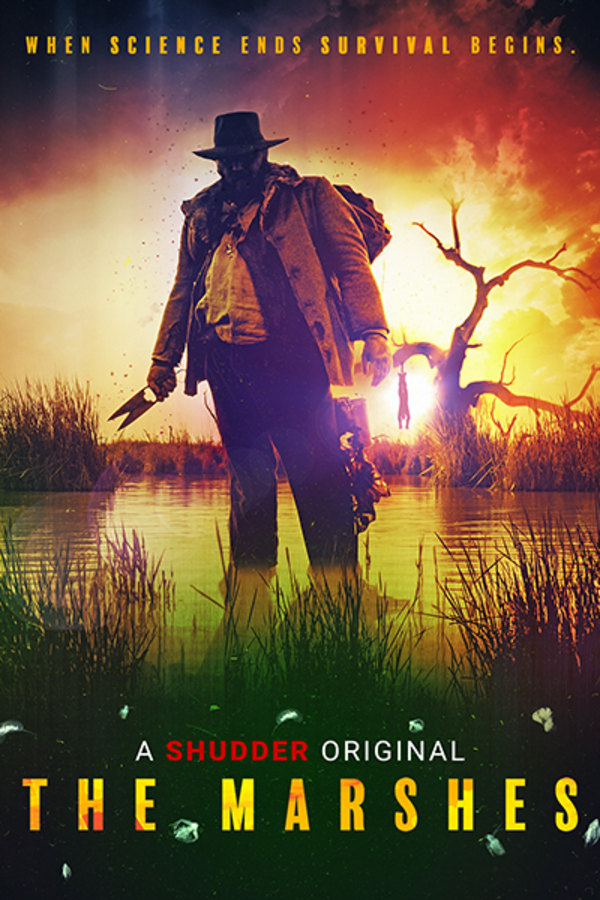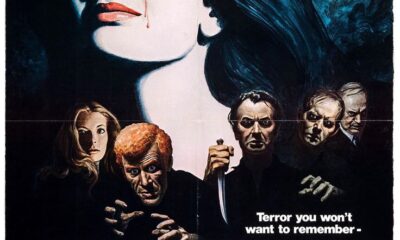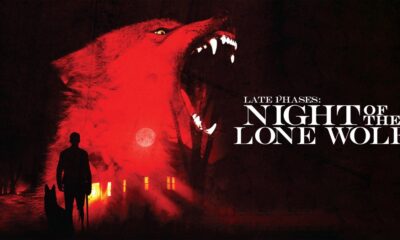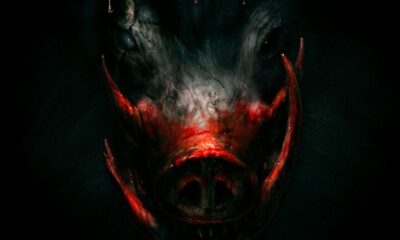
The Marshes film review: A slow fever dream mess
New Shudder original, The Marshes, has the ingredients for a decent horror film but it burns the recipe.
The Marshes, written and directed by Roger Scott, is a mess of a film. The most recent release on Shudder, three young biologists travel to a remote marshland to collect aquatic samples only to encounter a malevolent presence. It’s one part Blair Witch, one part Wolf Creek.
Promising plot. Poor execution
Now, before I start nitpicking the film, I want to give it some praise because I know it tried its best. You could see it trying, which is something you don’t always notice in a horror film; how hard it’s trying to scare you. The two best things about The Marshes are its lovely cinematography and it’s ending.
The film was shot by someone who loved sunsets. The way the sun hung in the sky before dusk, turning the landscape into a black silhouette, made for a marvelous setting. The shots of scenery were presented by an artistic eye, and this made the film very beautiful to look at.
However, I’m sorry to say that its scenery is the only marvelous thing about it. Even the best part of the story, the ending, was poorly executed. The film had a hard time setting itself up. This was clear by the awkward character interactions used to quickly transport them to the marshlands. It wants you to accept what’s being presented without question.

Poor characters
The actors in the film are green. Inexperienced and new to the camera, and while this isn’t a bad thing, it’s hard to ignore when the entire film is character-driven. Without special effects and a scarcely seen villain, we spend the entire 85 minutes with Pira (Dafna Kronental), Will (Sam Delich), and Ben (Mathew Cooper).
We never spend enough time with any of them to see past their one-dimensional character traits or to even care about their safety. Their unlikeable, arrogant and incredibly dumb. These people are practically begging to die. They do everything you’re not supposed to do in a horror movie.
Our leading lady is, unfortunately, the least likable of them all. This unlikeability comes from the film’s preference to tell over show. It prefers to recite facts and plot details, with blunt dialogue and misplaced revelations, rather than show us. We’re told Pira is smart and academically driven but we never see it.
If stripped of the opening scene where we’re told about Pria’s possible promotion and that she gave up a simple life in favor of being a scientist, we’d easily believe she’s just a woman who wandered into the marshlands by accident. Unprepared for the unforgiving terrain.

Lack of a plot
The Marshes starts off slow. Then, after about 40 minutes, logic flies out the window as the monster living in the marsh suddenly develops a taste for blood. It never says how long the three are there and if it did, I didn’t notice. However, they’re there for at least a few days. During that time together, a couple of shocking things happen but all are severely misplaced in the setting that they’re framed in.
Events such as love triangles and ghost stories occur at random intervals just for the sake of moving the film from point A to point Z. I feel that when they were crafting the storyboard, they didn’t know what to do. They wanted to explain the spirit haunting the marshlands and settled on a simple campfire legend that’s presented almost robotically.
There are moments where I thought I missed something. The characters speak to each other as if referencing past events that never occurred. I think Ben is meant to have romantic feelings for Pria but I honestly can’t tell. Ben and Pria are also meant to have known each other a while, but you can’t tell from their dynamic. The three interact like strangers at a potluck.
The Swagman
For a movie monster, the Swagman (Eddie Baroo) is about as one-dimensional as anyone can get. The story of the Swagman is that long ago (how long is never specified) he raped the wife of a Squatter. In retaliation, the Squatter followed the rapist into the marshland and drowned him. That’s as much backstory as we get, and apparently, it’s supposed to be enough, even though the spirit of the Swagman appears to be a cannibal.
Why is he a cannibal? Who knows. It’s not important. He appears and disappears throughout the beginning, haunting Pria’s dreams. There’s a moment where she runs from him (in her underwear) in slow motion and I couldn’t do anything but laugh. All attempts at suspense feel lazy, at least until the second half of the film where they go from 0 to 60 in the blink of an eye.
For the most part, nothing happens, until the characters are put into the marsh. Then things start happening rapidly fast, but I had a very hard time believing the suspense or feeling it. As they run from the Swagman, I didn’t feel their fear. I was just waiting for it to be over.
Verdict
Save yourself time. Don’t watch this. If you do and like it, then good for you, but it wasn’t for me.
Also, I have to bring up the editing and how God awful it is. Someone cut the scenes of this film as if they were Victor Frankenstein. Slicing and dicing every action sequence and then sewing them back together with only one hand.
 (2 / 5)
(2 / 5)
All photos courtesy of Shudder and 28 Productions
Movies n TV
Wheel of Time A Question of Crimson Is a Political Espionage Delight
Episode two of Wheel of Time felt like the beginning of a long journey. Stories are unfolding, lives are changing, and blood is spilling.
Let’s discuss.
The story
We begin this episode in the past with Elayne’s mother, Queen Morgase. It turns out her rise to the throne was a bit, shall we say, cutthroat. So when she shows up at the White Tower, Siuan is concerned.
She might have reason to be, too.
Meanwhile, Rand, Egwene, Moiraine, Lan and Aviendha are in the Spine of The World. As they travel through some of the most breathtaking lands I have ever seen on a TV show, Egwene is plagued with nightmares. We think at first that’s just her trauma working itself through her system. But we soon find out that it might not be that straightforward.
Finally, Perrin returns home to heal after his hand is almost cut in half. But when he gets there he finds the town has been infested by Children of The Light. And they’re looking for him.
What worked
There was something heartwarming in this episode about political espionage and choking religious persecution. And that is Elayne’s relationship with her family.
I have consumed a lot of fantasy content with royal families. And I have never once heard a princess call her mother ‘Mum’. I’ve never seen royal siblings get along. And I have sure as hell never seen a princess have a good relationship with her step-parent.
This was refreshing. Even though Queen Morgase is kind of a horrible person she seems like a good mother. And that’s an unexpected delight.

Of course, this is just one storyline among many. And while this can sometimes be overwhelming, in this case it wasn’t.
I’ll be honest, some of these storylines are going to drag for me. I know this because I’ve read some of the Wheel of Time books and I have an idea that not all the characters exactly pique my interest.
No one likes all the characters. No one likes all the storylines. While I am here for the political espionage between Queen Morgase and Siuan, not everyone likes it. While others might be fascinated with Selene trying to win Rand back, I couldn’t care less.
Having multiple storylines keeps everyone’s attention better. So long as things don’t get out of hand. Things can easily get out of hand. But this seems to be managed well.
So far.
What didn’t work
As I mentioned above, I’m not thrilled with Rand’s story at this point. And while it’s fine to not like a storyline when there are this many to choose from, it’s not fantastic that the one I like the least is the one involving our two main characters. And anytime we were with the team at the Spine of The World, the only thing that brought me joy was Moirain’s hat. It reminded me of Stockard Channing’s hat in Practical Magic.
The problem is that Rand is Charlie Brown with controversial magical powers. He is boring, serious, and pessimistic.
And yes, I understand that he has a heavy emotional burden and he’s the Dragon Reborn and that’s quite taxing and all. But let’s be fair, there isn’t a single person in this show that doesn’t have a heavy burden. And most of them manage to be fun occasionally.

All that being said, this episode of Wheel of Time did exactly what it needed to do. It set up conflicts at each of the three locations. It established emotional ties between the characters and the events. And it established goals for everyone.
This was, in short, a solid episode. Not groundbreaking, not mind-blowing or life changing. It was simply good. It was entertaining and moved the plot forward.
Well done.
 (3.5 / 5)
(3.5 / 5)
Movies n TV
Wheel of Time Returns With A Bang
Wheel of Time is back for season three. There are mixed feelings regarding this. Last season, there were some serious pacing issues. And some serious sticking to the book’s storyline issues. But we’re two seasons in, and we don’t give up so easily. So let’s dive into episode one, To Race the Shadow.
By the way, I highly recommend watching this episode with the subtitles on. You’ll see why.
The story
We begin this episode with Liandrin facing a trial of sorts for her rampant betrayal. She does her best to gaslight her Aes Sedai sisters into thinking that Siuan Sanche is the real traitor.

When that doesn’t work, she reveals how many Black Aes Sedai have actually infiltrated the tower.
Spoiler, it’s a lot.
In the aftermath, our whole team gathers to drink and enjoy one night of relaxation before they head out to the Tear to form an army for Rand. All is going well until they’re attacked by myriad creatures and a sentient axe.
What worked
This episode was long. It had a run time of an hour and eleven minutes. And a lot of that run time was spent in heavy dialog scenes.
Fortunately, these were well-done scenes.
If you’re going to have a lot of talking scenes, there are good ways and bad ways to do it. Last season, we saw lots of examples of the bad way to do it. But this episode did it well. For one thing, other things were going on while conversations were taking place. The characters are drinking, playing games, walking through an interesting city. And the scenes themselves didn’t stretch out. They weren’t repetitive. We heard what the character had to say, then we moved on.
It was also nice that the point of these scenes wasn’t just info dumps. We had character development. We had romantic interactions. We had plot development and foreshadowing.
Overall, this episode felt like what it was. A moment of calm before a storm.
Taking a step back, I’d be remiss if I didn’t address the fight scene at the start of the episode. Because it was epic.
The magic looked amazing. The martial arts that went along with it looked fantastic. The costumes were beautiful. It was just incredibly fun to watch.
More than that, it was emotional. We lost some characters in that fight that were important. And it was clearly emotionally shattering for many of our characters, who found themselves betrayed by people they trusted.
So many of them.
It was a great way to open the season.
What didn’t work
Despite that, this episode wasn’t without its flaws.
First off, there were a lot of dialog scenes. And they were good scenes, as I’ve already discussed. But it was one after another after another. And when your episode is, again, an hour and eleven minutes, it’s maybe a little much to have so much chit-chat. Couldn’t some of these conversations, important as they were, have been moved to maybe another episode?
Finally, I want to talk about Egwene’s travel through the arches.

I feel like maybe there were some deleted scenes here. Because there must have been more to that visit than what we saw, right?
We could have seen Egwene battle Rand. That would have been badass and emotionally devastating. We could have seen her with a quiet life with Rand back home at the Two Rivers. We could have seen anything except for the quick clip of Rand in a bloody river, followed by Egwene being shoved back out in a bloody shift.
No products found.
Bad job. But at least it wasn’t an extended scene of Moiraine collecting bathwater, and then taking a bath while looking sad. If we’d started this season with another scene like that, it might have broken my brain.
Amazon dropped the first three episodes at once. So we’ll be back soon to talk about episode two. See you then.
 (4 / 5)
(4 / 5)
Movies n TV
Entertaining as hell: Eight Legged Freaks (2002) Review
Early 2000s is a special era for the industry. It accepts the cheesiness and corniness of movie making, in turn producing some gems in their own right. Eight Legged Freaks starring David Arquette and young Scarlet Johanson is a horror comedy about giant spiders who overtake a small town. As crazy as that premise sounds, the movie surprisingly has a ton of heart and is super entertaining. Let’s review, shall we?
Plot
We start Eight Legged Freaks with a shot of toxic waste spilling into the water supply of Joshua, a spider farm owner. He is friends with Mike, one of our protagonists, who is a science geek and a spider enthusiast. Mike notices something quite right upon visiting Joshua, but no one takes him seriously. We are then introduced to the rest of the crew. Mike’s mother Samantha, the town sheriff, is too busy chasing Ashley, his sister, who is dating the town mayor’s son Bret (something Samantha does not approve of). We also have Chris, who returns to the town to save his father’s legacy in the town mines. He has opposition from Wade, Bret’s father, who wants to use the mines for his business ventures. Lots of drama going on that will only get juicier once the spiders get loose.
The creepy crawlies quickly dispose of Joshua and make their grand appearance after Ashley rejects Bret’s advances, abandoning him in the middle of a desert. A glorious chase sequence ensues as the spiders make their way towards the town, wreaking havoc on its residents. In a true horror fashion (which the movie acknowledges), it takes some convincing from Mike and then from Samantha for the town to take the threat seriously. The tongue-in-cheek style of narrative adds the comedy aspect to a movie that would otherwise burn out fairly quickly.
The remaining characters hide out in a shopping mall as it’s the only somewhat sturdy building in the area. This doesn’t last long as the spiders break in, forcing them to run through the mines. Their resources to fight the creepy crawlies off are limited as the methane gas doesn’t allow them to use firearms. Such conditions require resourceful thinking from Chris, who uses perfume to fend off the leader of the spider group and save himself during the climax of the movie.
Character dynamics are not forgotten once the action kicks in. We have Chris confessing his long-term feelings for Samantha which she knew all along, which provided some comedic relief. Bret also reunites with Ashley and apologises for being an asshole. Mike finally gets the appreciation he deserves as his knowledge saves the townsfolk more than once during the whole ordeal.
We end the movie with the town’s radio show person telling the story as an urban legend during his segment. This brings it into question – how much of it happened the way he said it did? We can only guess…
Overall thoughts
Eight Legged Freaks is a fun creature feature with some self-aware commentary on genre tropes that doesn’t take itself too seriously. The acting is good, the pacing fitting and the characters are likeable enough for you to want them to make it through. Definitely a must watch, if you don’t suffer from arachnophobia, that is.
 (5 / 5)
(5 / 5)
- What do you get when you cross toxic waste with a bunch of exotic spiders? Eaten! The townies of Prosperity, Arizona will all become a screaming smorgasbord if mutated arachnids as big as SUVs have their way in this comedy/horror crowd pleaser whose creators include the producers of Independence Day and Godzilla
- Spiders that leap like gazelles, web-spitting spiders, spiders that suck your insides out as if through a straw—they’re all among the behemoths conjured up by an inventive effects team
- David Arquette (Scream) leads the two-legged stars, mobilizing the citizenry in a last-ditch fight to survive
Last update on 2025-03-10 / Affiliate links / Images from Amazon Product Advertising API













